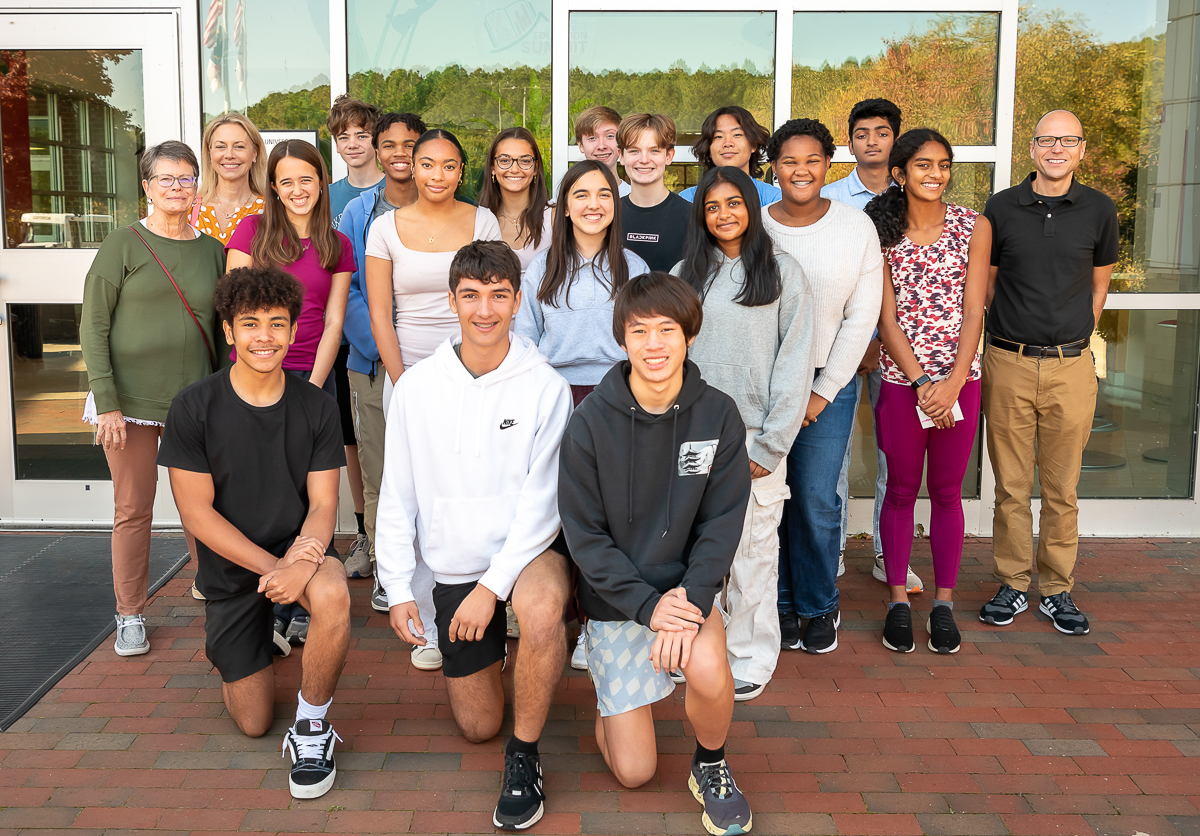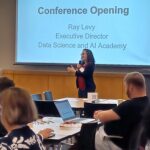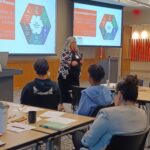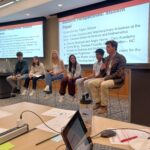Living and Teaching with Data: 2024 NC Data Science Education Summit Promotes Data Literacy in K -12 Schools
Written by Sarah Whichello, Communications Coordinator at the Data Science and AI Academy

On Oct. 24-25, 2024, the North Carolina State University (NC State) Data Science and AI Academy (DSA), Data Science 4 Everyone, the Friday Institute for Educational Innovation, The Science House and the North Carolina Department of Public Instruction’s Career and Technical Education (CTE) division hosted the second annual NC Data Science Education Summit. The event brought together educators, students and industry leaders to highlight the growing need for data science curricula in North Carolina schools and promote data literacy among students and educators.
The 2024 Summit’s focus on CTE educators and data science pedagogy grew from DSA’s work on CS-30, a revised Introduction to Data Science course that, in response to newly passed North Carolina legislation, could help students meet the Computer Science Graduation Requirement. Input from the 2023 Summit laid the groundwork for the revision of CS-30 and helped course architects cater curricula to meet the specific needs of North Carolina students and educators. The 2024 Summit brought together CTE directors and teachers to explore how CS-30, as well as broad-spectrum data science components, could be implemented throughout North Carolina schools.
Taryn Shelton, DSA’s K -12 Data Science Program Coordinator and primary organizer of the 2023 and 2024 Data Science Education Summits, emphasized the importance of including students in discussions about their education. “Data science is a tool for student agency,” Shelton said. “We want to give students a voice in decisions about their learning.” Shelton works with the Consortium for Mathematics and its Applications (COMAP), NC State partners and districts across North Carolina to help educators integrate data science into their classrooms. Her work and commitment to data literacy shaped the 2024 Summit’s focus on collaboration between students and educators, K-5 professional development, and exploration of the role of data science and artificial intelligence (AI) in early education.
As data literacy becomes a required competency in North Carolina classrooms and a key skill in the modern workforce, the DSA and its partners are committed to supporting both students and educators in adapting to new curricula. “It’s all about preparing students to be innovators, problem solvers and leaders of the future,” explained Ray Levy, executive director of the DSA, during her opening remarks at the Summit.
Day 1: Integrating Data Science into K-12 Education
The first day of the Summit focused on integrating data science into CTE courses and supporting educators as they develop new data science curricula. Speakers such as Marnie Hill from the North Carolina Computer Science Teachers Association (NCCSTA) emphasized that introducing data science early in K -12 education paves the way for success in STEM careers. By teaching students data science skills, educators are preparing them for a future in a tech-driven society where data science and AI literacy is integral.
Day 1 began with a group activity led by Hollylynne Lee – a Distinguished University Professor of Mathematics and Statistics Education at NC State and Senior Faculty Fellow for the Friday Institute for Educational Innovation – on using the Common Online Data Analysis Platform (CODAP), a web-based data analysis tool, to engage students in the classroom. Lee led educators and students in a mock lesson that used CODAP to examine data on U.S. average salaries and the gender wage gap.
Lee’s activity allowed students and educators to brainstorm and interpret data visualizations together. “Having students there actually helped educators better engage with the material,” Shelton noted. “As teachers, we work best when we work with our students. We are continually inspired by them, and they drive us toward creative solutions. Activities like this are invaluable because they allow educators to apply student feedback in real-time.”
Student voices continued to drive conversations during a student-led panel featuring participants from Cary Academy, North Carolina School of Science and Mathematics, Wilson Economic Development Council and NC State’s Rural Works program. Student panelists shared their experiences with data science, noting its relevance in their daily lives. One student mentioned how social media algorithms, which use data science to curate content, have become a ubiquitous part of their routine. Students agreed that understanding how algorithms work is essential for being informed, mindful consumers of digital content. “By analyzing data, you can make decisions based on evidence, not assumptions,” one student explained. “Data science is all around us, and we need to learn how to live with it, not fight against it,” said another student.
Participants joined a variety of breakout sessions hosted by speakers such as Luka Perkovic and Reggie Manning from Vista Data, who led a session titled “Data Visualization in Tableau,” in which participants learned how to address real-world scenarios in business, finance or marketing with data-driven insights using Tableau. Pulkit Agarwal from Strive Education led another session titled “Bringing Real-World Data Science into Any Classroom Using AI,” in which he discussed individualized data science consulting projects and showed teachers how they could use an AI bot to set up real-world projects for specific subjects, grades and learning outcomes.
Student-Led Insights: Real-World Applications of Data Science
During the Summit’s “Lightning Talks,” Katie Kilgallen, a 12th-grade dual-enrolled student from the North Carolina School of Science and Mathematics online program and Chapel Hill High School, presented a project in which she and her peers analyzed 2022 water quality data from the Lake James Environmental Association. By using Python to translate years of water quality data into interactive visualizations, Katie and her team made complex information more available. This project underscored how data science can transform raw data into insights that are easy to understand and act upon.
In another session, Christin Phelps, an instructor of AI ethics at DSA, led a discussion on the growing role of AI in the workplace. Phelps stressed the need for AI and data literacy, warning that AI, when misused, could undermine communication and create knowledge gaps. However, when used responsibly, AI offers vast potential. These conversations highlighted the importance of both educator and student perspectives in shaping curricula that equip learners with the skills to use AI and data science tools thoughtfully and effectively.
Day 2: Data Science in Early Education
Day 2 of the Summit was dedicated to professional development for K -5 educators, focusing on how to introduce data science concepts in elementary classrooms. Kate Farrell and Tommy Lawson from the University of Edinburgh led a program titled “Saving the World with Data,” which provided hands-on lesson plans addressing global issues such as sustainability and poverty through the lens of data science.
One engaging activity involved students collecting plastic waste at school to create visual charts that displayed the impact of overconsumption. By physically handling data in this way, students gained a deeper understanding of environmental issues and how data can drive change. The lesson plans also encouraged teachers to think about how data science can be integrated into everyday learning. During the Summit, educators had the opportunity to act out these lesson plans and discuss ways to implement them in their classrooms.
These early-education strategies align with similar themes in DSA undergraduate courses, such as “Data Science for Social Good,” “Data Communication,” and “Data Physicalization.” Both K -12 and university-level courses emphasize the intersection of data analytics and social issues, empowering students to use data science not just for academic growth but also for social impact.
Closing Remarks: Empowering Future Generations
The Summit concluded with a talk from Mahmoud Harding, an instructor at NC State and Director of Instructional Design at Data Science 4 Everyone. Harding, a North Carolina native from a rural area, shared how education shaped his life and career, inspiring him to become an educator and resource within and beyond the academic community. Harding reminded attendees, who he described as “teachers of the 22nd century,” of the Summit’s core mission: to equip educators with skills that empower them to pass on essential knowledge to future generations. He urged participants to take seriously the task of helping students “make intuitive claims and have skeptical questions about data” and to lean on the DSA and Summit partners as they navigate data science integration in K-12 spaces.
From its inaugural debut in 2023, the Summit has enabled collaboration among data science education partners who may not usually have opportunities to meet in one space. The 2023 Summit brought together state instructional leaders, teachers, administrators and education researchers to discuss data science education approaches and the benefits and challenges associated with integrating data science education in K-12 spaces. Building on the previous year, the 2024 Summit brought together CTE teachers, students and the North Carolina Department of Public Instruction to continue the conversation and workshop data science instruction models in real time. The 2024 Summit also integrated student voices through student-led panels and collaborative teacher-student workshops.
Although the 2025 Summit theme has yet to be released, it, like past Summits, will bring key voices into a larger, ever-evolving conversation – one that seeks to answer the question: How can North Carolina educators effectively integrate data science in K-12 spaces and facilitate career readiness for students entering a job market that demands data literacy? There is not currently a clear answer to this question; the Summits and partnerships created therein have led to actionable solutions that bring North Carolina one step closer to data literate classrooms.
Events such as the Data Science Education Summit are crucial in ensuring that both students and educators are prepared for the future. As technology and job market demands continue to evolve, so too will the trajectory of data science education. The Summit’s adaptable structure and basis in current discourse allow it to meet individual and big picture needs as they arise. Similar events should be hosted by other institutions to foster a broader understanding of data science education and best practices.
Want to make sure you don’t miss the 2025 Data Science Education Summit announcement? Subscribe to the DSA Newsletter. For more information on how to get involved with future Summits or to learn more about CS-30 and other data science education initiatives, contact Taryn Shelton (tshelto3@ncsu.edu).









